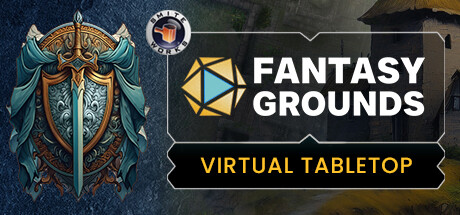Preliminary Review — Fantasy Grounds Unity
Release Date: November 5, 2020
Author: CasualPlayer23
What is Fantasy Grounds Unity?
Fantasy Grounds Unity (FGU) is a feature-rich virtual tabletop (VTT). It hosts pen-and-paper roleplaying games online or alongside an in-person table. Rather than being a single story-driven title, FGU functions as a toolbox. It gives Game Masters and players systems, assets, and automation to run Dungeons & Dragons, Pathfinder, Fate, Numenera, Starfinder, and many others. In addition, you can also create homebrew worlds with it. The Unity edition modernized the platform. Specifically, it added 64-bit support, updated visuals, and cross-platform compatibility for Windows, macOS, and Linux.
How it Supports Storytelling
FGU does not tell a story for you. However, it helps you tell better ones. Its narrative strengths include:
- Integrated rulesets and data libraries that automate dice rolls, hit checks, spells, and conditions.
- Ready-to-play modules and licensed content that allow GMs to drop in polished adventures with minimal prep.
- Dynamic Line of Sight (LOS), lighting, and secret areas that let GMs reveal scenes gradually. This, in turn, preserves suspense and exploration.
- Token and asset systems that give NPCs and locations visual identity, which deepens immersion.
As a result, FGU acts less like a narrator and more like a stagehand that makes storytelling smoother.
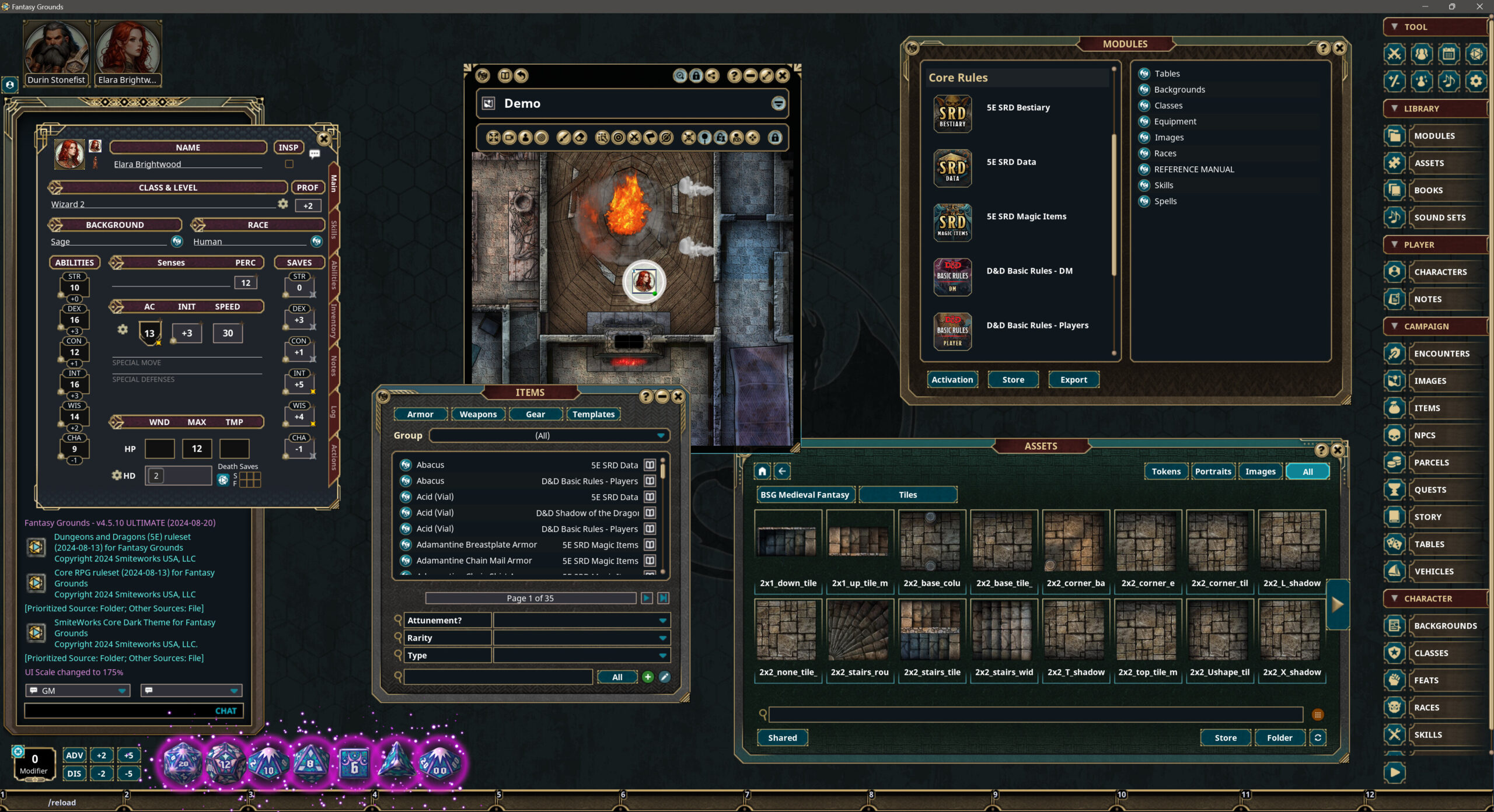
Core Mechanics & Features
FGU focuses on tools GMs and players use in every session. Consequently, the feature list is extensive:
- 64-bit support for larger campaigns and richer asset libraries.
- Cross-platform play and a network lobby. This removes the pain of port forwarding and, furthermore, lets players join free with the Demo client.
- Ruleset automation for many systems: D&D (1E through 5E), Pathfinder 1/2, FateCore, Numenera, Starfinder, CoreRPG, and more.
- Tile-based map building with dynamic LOS, drawing tools, animated effects, and image-based terrain painting.
- Top-down 2D and pseudo-3D token views. These allow relative NPC sizes and object placement with depth in mind.
- Local asset library plus included packs like Combat Battlemaps, Shockbolt GMW Kit, Saz Asset Pack, and Torsten’s Asset Pack.
- Backward compatibility with previous Fantasy Grounds campaigns and DLC.
Overall, these mechanics emphasize flexibility while reducing repetitive manual work.
Visuals & Audio
Unity brought a visual refresh over earlier Fantasy Grounds builds. Not only did it update themes and skins, but it also added animated image effects and a more modern UI palette. The map tools now produce eye-catching battlemaps when paired with included or third-party art.
On the audio side, FGU remains more functional than flashy. While sound effects and ambient tracks are supported, there is no tightly integrated voice or video chat. Therefore, most groups pair it with Discord, Zoom, or similar tools for live chat and streaming music.
Content Library & DLC
One of Fantasy Grounds’ biggest selling points is its library of officially licensed modules and rulebooks. The platform ships with multiple rulesets and data libraries (D&D 5e SRD, Pathfinder SRD, FateCore, etc.), along with sizeable asset packs for maps, tiles, and portraits.
Because of this ecosystem, GM prep time decreases significantly. Many modules arrive pre-populated with monsters, encounters, and maps ready to drop into a session.
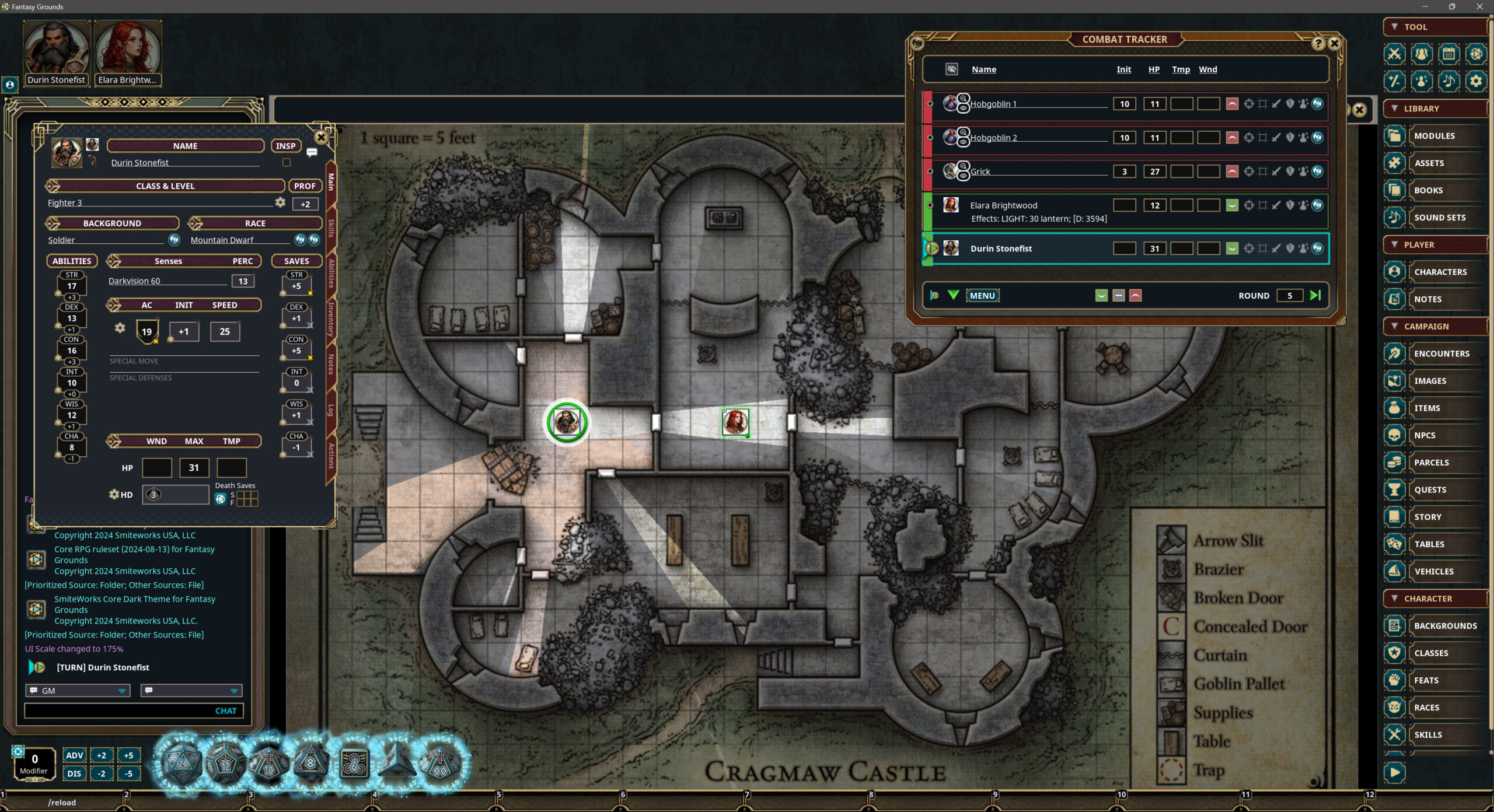
Community, Support & Modding
FGU benefits from an engaged community and a long history of add-ons, community rulesets, and forum-driven support. Moreover, while the official DLC library is robust, the community contributes free rulesets and assets that expand what you can run.
SmiteWorks (the publisher) continues to update the client, and, importantly, the simplified licensing in Unity makes it easier to invite players who only need the free client.
User Reviews & Overall Rating — What Players Are Saying
Steam overview: Very Positive — 82% of 747 reviews (All Time).
That “Very Positive” score reflects clear strengths most reviewers mention and a handful of consistent pain points. Reading across the community feedback reveals these patterns:
- Praise
- Powerful automation for supported systems — players love not having to manually track every roll, save and status change.
- Extensive licensed content and ready-to-run modules — huge time-saver for busy GMs who want polished adventures.
- Robust map and token tools — dynamic LOS and animated effects earn frequent compliments for improving immersion.
- Cross-platform play and the free player hosting model — makes it easy to run mixed-platform groups without extra fees.
- Criticism
- A steep learning curve — many reviews say the interface can be intimidating at first and that setup takes patience.
- Cost of official DLC — while the platform itself is powerful, building a “complete” library often requires purchasing multiple rulebooks and modules, which some users find expensive.
- Occasional bugs or rough edges — Unity improved a lot, but some users report stability issues or feature inconsistencies compared with newer competitors.
- Limited integrated voice/video — many players expect an all-in-one communication solution and instead pair FGU with external apps.
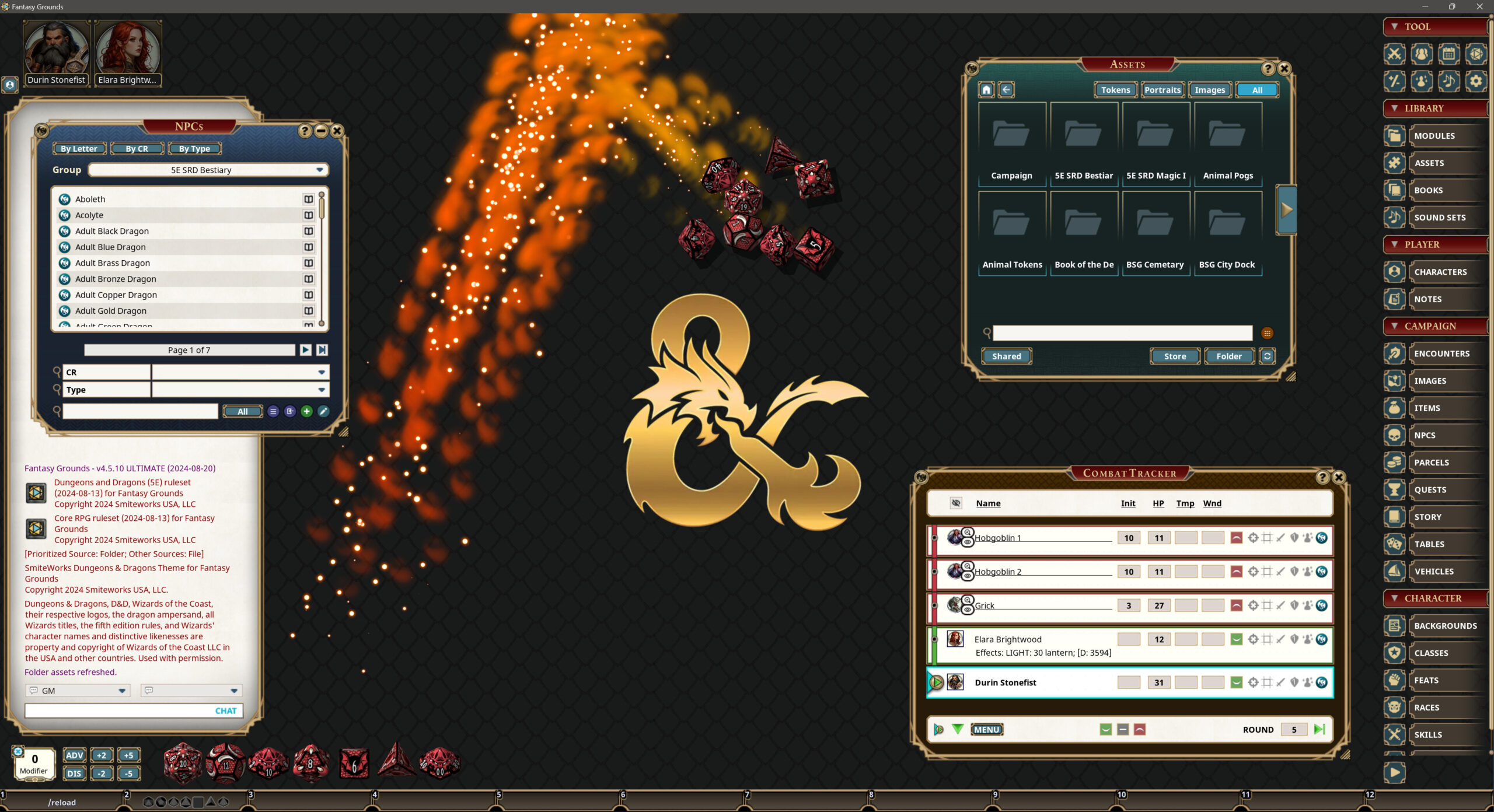
Strengths
- Depth of automation for supported systems — fewer manual calculations, more focus on roleplay.
- Vast official content library — ideal for groups who prefer published adventures.
- Advanced map and token features (dynamic LOS, lighting, tile-based maps) that increase immersion.
- Cross-platform and free player hosting simplifies group logistics.
- Backward compatibility protects the investment of long-time users.
Weaknesses
- Learning curve can be steep for new GMs and players used to simpler UIs.
- Assembling a full suite of official content can be costly.
- Less polished in voice/video integration compared to some competitors that bundle those services.
- Some users report occasional stability issues or feature parity gaps versus competing VTTs.
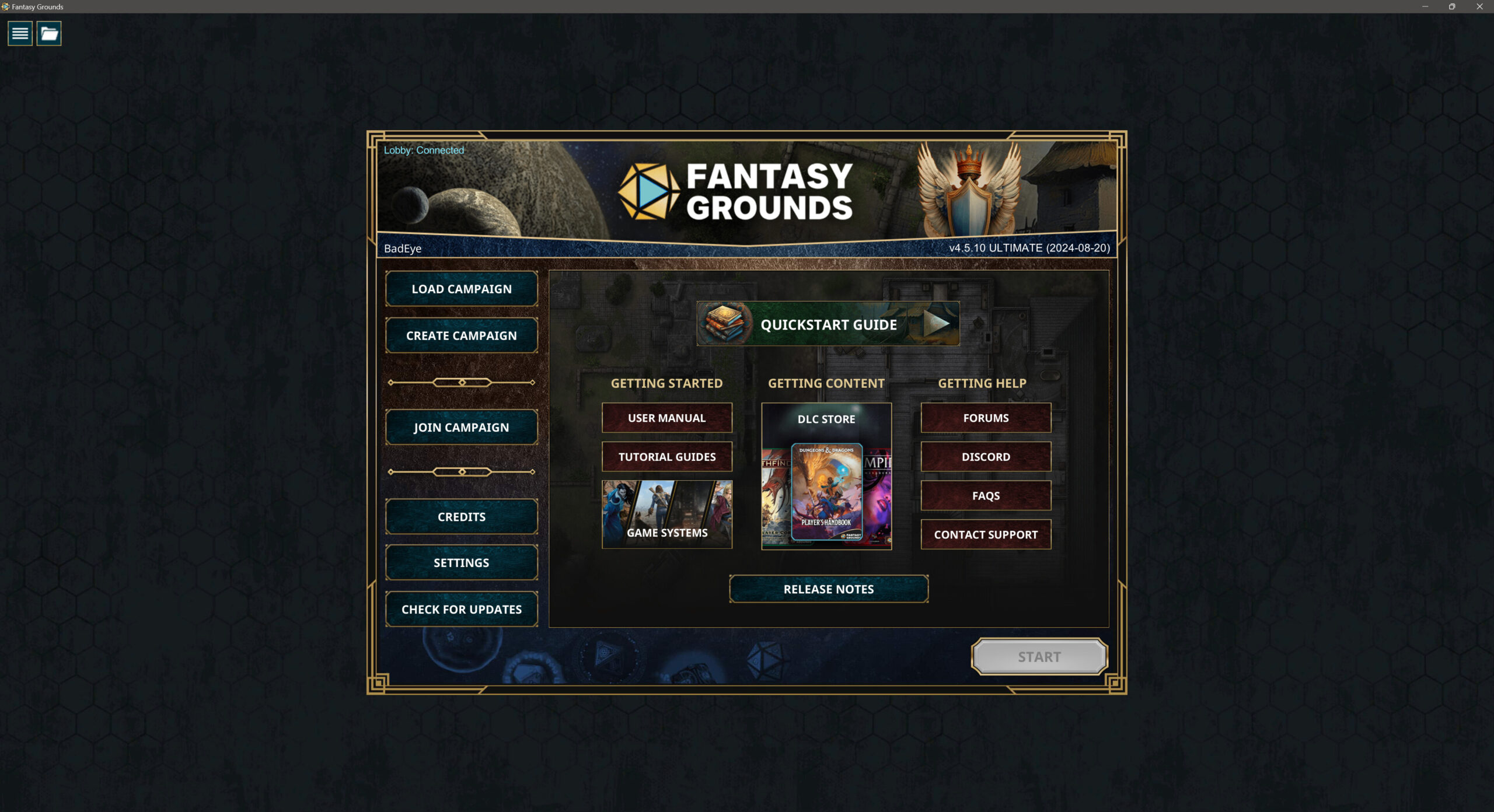
Impact on the Industry
Fantasy Grounds Unity helps define what a mature VTT looks like: deep rules automation, a vast licensed content ecosystem, and powerful map tools. Furthermore, its model — sell the platform and premium modules while allowing free players to join — influenced how publishers package digital tabletop content.
For groups who rely on official adventure modules and automation, FGU remains one of the most complete options available. It also became especially valuable during the acceleration of remote tabletop play, allowing long-running campaigns to move online with minimal compromise.
Who Should Try Fantasy Grounds Unity?
- GMs who want a high degree of rules automation and access to licensed modules.
- Groups comfortable learning a deeper interface in exchange for more powerful features.
- Players who value polished combat workflows, dynamic LOS, and localized asset libraries.
- Those who don’t require native integrated voice/video and are happy to use external chat tools.
Tips for New Players & GMs
- Start with a single ruleset and a small module to learn the basics before expanding your library.
- Use the bundled asset packs to experiment with maps and lighting effects — they’re great for practice.
- Also, rely on community tutorials and the forums — many players share starter templates and helpful macros.
- Plan to pair FGU with a separate voice/chat service for the smoothest live play experience.
Final Thoughts
Fantasy Grounds Unity is a cozy, powerful workshop for tabletop storytellers who want deep automation and a wealth of official content. Its “Very Positive” Steam rating (82% of 747 reviews) shows the community values its depth and capabilities. At the same time, the recurring criticisms — a steep learning curve and costly DLC — are fair trade-offs to weigh. In conclusion, if you enjoy tinkering with tools, lean on published adventures, or rely on rule automation, FGU is worth exploring. However, if you prefer a gentler onboarding or integrated media chat, you might want to trial the free client first.
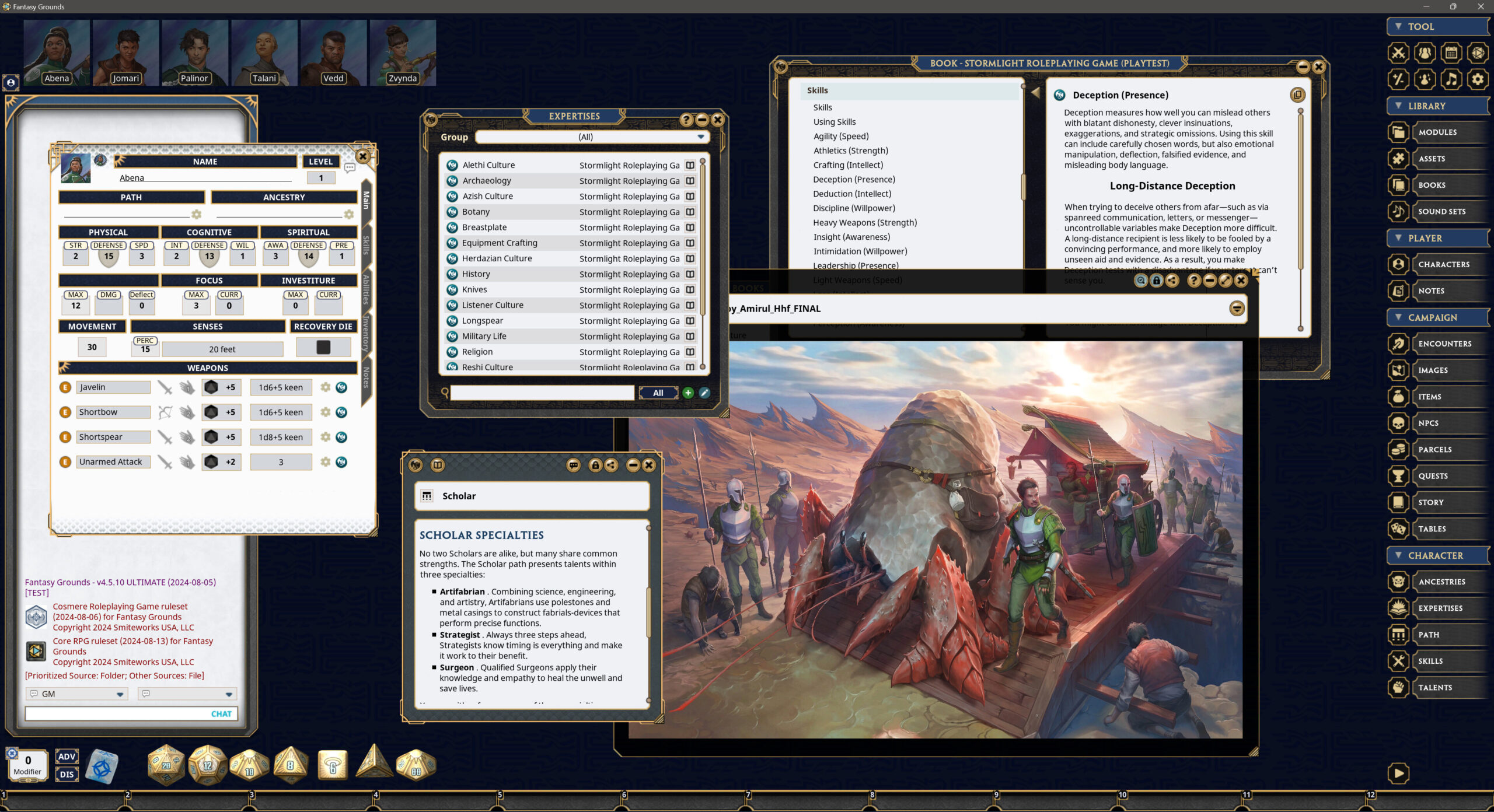
Recommended for: Experienced GMs, groups that use official modules, and players who want automation and map tools.
Try before you buy: Yes — the free demo client and easy hosting make testing simple.

